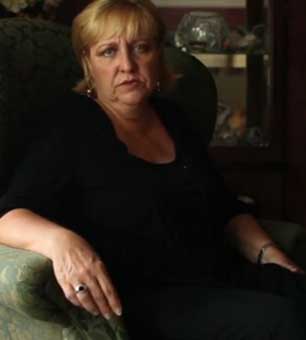Part of the Series
Gas Rush: Fracking in Depth
 Tish O’Dell, co-founder of Mothers Against Drilling in Our Neighborhoods. (Photo: Andrew Spear)Truthout combats corporatization by bringing you trustworthy news: click here to join the effort.
Tish O’Dell, co-founder of Mothers Against Drilling in Our Neighborhoods. (Photo: Andrew Spear)Truthout combats corporatization by bringing you trustworthy news: click here to join the effort.
The oil and gas boom is known for turning rural neighborhoods upside down as massive drilling rigs arrive, bringing new wealth, industrial development, environmental problems and media controversy with them. Broadview Heights, Ohio, however, isn’t the typical farming community that is so often associated with oil and gas drilling.
Nestled in the southern end of Cleveland’s considerable sprawl, much of Broadview Heights is distinctly suburban, especially Michelle Aini’s neighborhood. Aini lives in bright development with trees so small that they can only be a decade or so old. The relatively new houses on her block are all tall, boxy, strikingly similar and well kept, carrying the trademarks the upper-middle class’s Midwestern American dream.
About 79 gas wells have been drilled in Broadview Heights since 2005, including one well about 600 feet from Aini’s house. Last year a gas leak at the well had Michelle fearing for the safety of her family. Trees hide the well from view.
“The trees are our saving grace right now,” Aini explains in her driveway after sending her six-year-old son off with a babysitter. When the well was fracked and drill rig was in the air, she would later explain, she felt like she was “living in Texas.”
In 2004, the Ohio legislature took the right of local municipalities to regulate the permitting, spacing and location of oil and gas wells. As a result, the gas rush has brought small, conventional fracking operations and wells into neighborhoods.
Under Ohio law at the time the well near her home was drilling, only those living within 500 feet of a well had to be notified about the drilling, Aini said. Her neighbor received a notification letter last summer, but her the Aini and her husband did not.
The gas wells have Aini and her ally Tish O’Dell up in arms. Together they founded the group Mothers Against Drilling in Our Neighborhoods. The two women are working to put a “homeowners bill of rights” on the local ballot and put a stop to future drilling.
A drilling company that sells a purified brine solution produced during drilling as a road deicer has sued Aini and O’Dell for defamation after the woman raised concerns that toxic fracking fluid was being poured on local roads.
The gas wells have caused conflict between neighbors, including in Aini’s neck of the woods, where several other families co-own the well slowly churning out oil and gas from below the properties behind Aini’s home.
Brian Dunlap, a co-owner of the well behind Aini’s house, is a local firefighter who is happy to be getting free gas and some extra cash from the well. He said he does not feel the well is a threat to his family, and just like Aini was never notified or asked if she wanted to live near a gas well, no one ever asked his family if they wanted to see the subdivision the Aini’s live in go up nearby.
“Its only controversial for people [who] are not getting the royalties,” Dunlap said. “I have never met a person getting royalties who has a problem with anything.”
Dunlap said he has also been approached by a big fracking firm about drilling a much unconventional and much more lucrative well near or on his family’s rural farmland in another area, but has not signed a lease because he wants assurance that the neighborhoods water wells will not be compromised.
Press freedom is under attack
As Trump cracks down on political speech, independent media is increasingly necessary.
Truthout produces reporting you won’t see in the mainstream: journalism from the frontlines of global conflict, interviews with grassroots movement leaders, high-quality legal analysis and more.
Our work is possible thanks to reader support. Help Truthout catalyze change and social justice — make a tax-deductible monthly or one-time donation today.